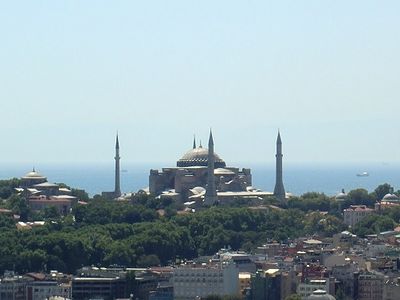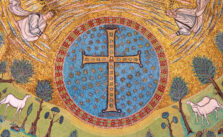We continue our discussion with Mitred Archpriest Valentin Asmus, rector of the Church of the Intercession of the Most Holy Theotokos in Krasnoye Selo, and Doctor of Theology.
“The Body of Christ, Always Being Broken”We discuss how believers lived during the Soviet era with Mitred Archpriest Valentin Asmus, rector of the Church of the Intercession of the Most Holy Theotokos in Krasnoye Selo, and Doctor of Theology.
“>Part 1
 Archpriest Valentin Asmus —Father Valentin, one of your scholarly interests is Byzantinology. One often finds oneself involuntarily comparing the Byzantine and Russian empires. Questions arise, and I would like to ask you some of them. Our Orthodox faith came from Byzantium, and this was the greatest divine gift to the Russian people. How did Orthodoxy influence the spiritual and historical development of our people and the formation of the Russian state?
Archpriest Valentin Asmus —Father Valentin, one of your scholarly interests is Byzantinology. One often finds oneself involuntarily comparing the Byzantine and Russian empires. Questions arise, and I would like to ask you some of them. Our Orthodox faith came from Byzantium, and this was the greatest divine gift to the Russian people. How did Orthodoxy influence the spiritual and historical development of our people and the formation of the Russian state?
—“Byzantium” is a false name, invented its enemies destroyed it. In Byzantium itself, this name was known as the former name of the capital— The Fall of Constantinople, Queen of CitiesOn May 29, the Orthodox Church remembers the Fall of Constantinople, the Queen of Cities, in 1453. Named after Saint Constantine the Great, Constantinople was the capital of the Byzantine Empire (330-1453). Although Byzantium’s vast power spanned 11 centuries, its story is often held hidden.
The Fall of Constantinople, Queen of CitiesOn May 29, the Orthodox Church remembers the Fall of Constantinople, the Queen of Cities, in 1453. Named after Saint Constantine the Great, Constantinople was the capital of the Byzantine Empire (330-1453). Although Byzantium’s vast power spanned 11 centuries, its story is often held hidden.
“>Constantinople. Since literature cultivated the archaic, historians often used this term to refer to the City, just as the empire’s enemies (the Arabs, the Turks) were sometimes called “Persians,” a term for the ancient adversaries of the Greeks. The name Byzantium is commonly accepted, but we should not forget its inadequacy.
The influence of Byzantium on the Slavs, Romanians, Georgians, Armenians, and even the West is immeasurable. It is much easier to list what we did not inherit than what became “flesh and blood” for us. We did not inherit the Greek language. Some cultural historians lament that if Greek had become what Latin was in the Germanic West, we would have had direct access not only to antiquity but also to the immeasurable riches of Byzantium itself. Indeed, until the seventeenth century, when we had schools of the Western type, we had no theology, and there was not even the possibility to translate the Greek Church Fathers; instead, nearly exclusively South Slavic translations were in use. Even in the Nicene Creed, there were translation errors: “there is no end” (of the kingdom).
The Russian chronicle refers to the Byzantines as Greeks. This not only ignores their self-designation but also a significant misunderstanding of them. From the very beginning of Christianity, the Byzantines renounced the name of Hellenes. In the New Testament, “Greek” is not so much an ethnonym but a term for the pagan religion (John 12:20; Acts 11:20; 19:10; 17:20, etc.). How did those who renounced the name of Hellenes refer to themselves? They called themselves by the name of their state—Romans. Even when the Roman Empire was pagan and persecuted Christians, the holy apostles Peter and Paul spoke positively of it (1 Peter 2:13–17; Romans 13:1–7; 1 Timothy 2:1–2).
 The Russian theologian, Protopresbyter John Meyendorff, wrote that no one converted as many people to Christianity as Emperor Constantine the Great. In Byzantium, three principles were united. The Christian faith sanctified and spiritualized the Roman state and Greco-Roman culture. The cultural brilliance and spiritual radiance of Byzantium enlightened and illuminated the surrounding nations. When the old, weakened Byzantium could no longer directly guide the peoples, a community of nations and states spiritually nourished by it formed around it, which the Russian-English scholar Dmitry Obolensky aptly called the Byzantine Commonwealth—a fellowship of nations. Byzantium remained the ideal-symbolic head of this fellowship.
The Russian theologian, Protopresbyter John Meyendorff, wrote that no one converted as many people to Christianity as Emperor Constantine the Great. In Byzantium, three principles were united. The Christian faith sanctified and spiritualized the Roman state and Greco-Roman culture. The cultural brilliance and spiritual radiance of Byzantium enlightened and illuminated the surrounding nations. When the old, weakened Byzantium could no longer directly guide the peoples, a community of nations and states spiritually nourished by it formed around it, which the Russian-English scholar Dmitry Obolensky aptly called the Byzantine Commonwealth—a fellowship of nations. Byzantium remained the ideal-symbolic head of this fellowship.
Due to the upheavals of the last centuries, the name and concept of “empire” has lost its value. The British Empire, the French Empire, the Japanese Empire, and the Siamese Empire all appeared… To destroy the legitimate Austrian Empire, the Prussian-Berlin Empire arose. All of this distorted the concept of “empire” that lived in Byzantium and which even some of its contemporaries did not fully understand. Once, Grand Duke Vasily Dmitrievich1 declared: “We have the Church, but no Tsar.” He was referring to the Church of Constantinople, one of whose metropolias was Russia, and the Byzantine Emperor, who until then had been commemorated in Russian churches alongside the Patriarch of Constantinople.
In response to this challenge, Patriarch Antony IV said: “There is nothing good in what you say, that we have the Church but no Tsar; it is impossible for Christians to have the Church but not a Tsar, for the Kingdom and the Church are united and have communion, and it is impossible for them to be separated from each other… listen to the supreme Apostle Peter… ‘Fear God, honor the King’… He did not say ‘kings’ so that someone might think that he was speaking about the so-called kings of separate nations, but ‘the King’, showing that only one universal King exists… for if other Christians have arrogated to themselves the title of king, this is unnatural and unlawful, and is rather in the order of tyranny and violence, for which fathers, councils, or canons speak of them? But of the natural king, whose laws, decrees, and commands are respected throughout the entire world and who alone is commemorated by Christians everywhere, and not any other.”
And if by God’s allowance the place ruled by the king is surrounded by pagans, even to this day the king receives such an ordination from the Church, with the same rite and prayers, is anointed with holy oil, and is ordained as the king and autocrat of the Romans, that is, of all Christians.”
Here, the self-awareness of Byzantium is briefly expressed—a consciousness of the great responsibility of universal service. This service was not to the state, nor to a people or peoples, but to God, to Christ’s truth and righteousness.
This is the people’s religious upbringing. This is the Christian mission to non-Christians. To fully accept this teaching, one must spiritually mature and develop culturally in every aspect. Mere willpower for succession is entirely insufficient. When  The text of the film “The fall of an empire—the Lesson of Byzantium”In response to numerous requests from our readers, the editors of Pravoslavie.ru present an English translation of the text of the film, “The Fall of an Empire—the Lesson of Byzantium.”
The text of the film “The fall of an empire—the Lesson of Byzantium”In response to numerous requests from our readers, the editors of Pravoslavie.ru present an English translation of the text of the film, “The Fall of an Empire—the Lesson of Byzantium.”
“>Byzantium fell, Russia could only enter into its inheritance. The responsibility for the fate of universal Orthodoxy became an unalterable task for Russia, but various means for the successful execution of this task were tragically lacking. The famous Prince Kurbsky had serious theological interests. Desiring to study the dogmatic works of Saint John of DamascusSaint John of Damascus was born about the year 680 at Damascus, Syria into a Christian family. His father, Sergius Mansur, was a treasurer at the court of the Caliph.”>St. John of Damascus, in his distant exile he studied Latin to read St. Damascene in a Latin translation. Had he stayed in the kingdom of Ivan IV Vasilievich, alas, he would have scarcely found a shorter path to Damascene. The appearance of the complete Slavic Bible (for the first time in history) in 1499 in Novgorod was made possible because the holy hierarch Saint Gennadius invited Catholic monks who, not knowing Greek, translated the missing books from their Latin Vulgate. What more can be said, when even direct heirs of Byzantium, such as
 St. Maximus the GreekLife in prison was difficult for the Venerable one, but amid his sufferings, he also experienced God’s great mercy and kindness: An angel appeared to him and said, “Persevere, O Elder! Through these trials you will avoid eternal suffering.””>St. Maximus the Greek and the Likhuda brothers, had to study at Western universities because there were no other options? The creation of an Orthodox higher education system was an urgent, though by no means the only, task for post-Byzantine Russia.
St. Maximus the GreekLife in prison was difficult for the Venerable one, but amid his sufferings, he also experienced God’s great mercy and kindness: An angel appeared to him and said, “Persevere, O Elder! Through these trials you will avoid eternal suffering.””>St. Maximus the Greek and the Likhuda brothers, had to study at Western universities because there were no other options? The creation of an Orthodox higher education system was an urgent, though by no means the only, task for post-Byzantine Russia.
— All our sovereign rulers have earned much praise and gratitude from posterity. The first tsars of the Romanov dynasty inherited a country ravaged by the Time of Troubles, with historical lands torn away, and turned it into a great and beautiful empire with the help of the hardworking people. However, our own television, which broadcasts series about Russian emperors and empresses, often distorts our national history. How should we view this?
— I out of principle do not watch films about tsars and White Guard officers.
— I would like to continue on this topic a little. It seems that in these pseudo-biographical TV adaptations, the name of Empress Catherine the Great, who did so much for the Russian state, has suffered the most.
— We can talk for a long time about the indisputable achievements of the reign of the Great Catherine, her glorious victories and other accomplishments, and the great benefactions she bestowed upon the Russian people. But I would also like to mention one controversial action of her reign—the secularization of church lands. In our time, any conscientious person with an internal imperative for justice cannot have objections to the Church’s right to own land. But in the eighteenth century, estates were inseparable from serfs. And these serfs, giving the Church the dubious reputation of being the main serf-holder in Russia, represented a serious problem in the eyes of the state. The ruthless exploitation of serfs often led to uprisings, which were a significant issue during the reign of Catherine II. And when there were no uprisings the serfs complained, and their complaints flooded the state institutions. The conversion of “Church” peasants to the category of “economic” (state-owned) solved the problem, as their status was considered desirable.

A phrase circulates that by carrying out the secularization, Catherine “distributed estates with all the peasants to her favorites.” This is slander. Even if she had wanted to distribute nearly a million (over 900,000) former church peasants, it would not have been easy. But such squandering of state property was not in the customs of the empress. She could have awarded estates with state peasants only to her associates of the caliber of Suvorov and Potemkin, regardless of the nature of their personal relationships. And when there were personal motives for granting estates, she would purchase them with her own money (landowners could sell their estates, and they were traded on the market) or acquire something else, such as good city houses. Secularization, being a blessing for the peasants, was also a blessing for the monasteries themselves. They returned to wise governance, the tradition of eldership was revived, the Philokalia was studied, and the nineteenth-century flourishing of monasticism in was secured.
—Father Valentin, I would like to ask you as a philologist. In recent years, there has been a wave of obscene cursing among our people. It has affected not only, as they say now, the marginalized, but also educated people, workers of culture; these words can be heard from the television screens, and, tragically, even children of primary school age are caught up in this foul language. Father, what do you think, where has this great surge of profanity come from? How can reasonable people refuse it, and perhaps try to explain to the foul-mouthed why this is not just bad, but dangerous for their lives?
—One should not think that “serious cursing” is only an achievement of our own time. Before the revolution, it was much worse. No, it wasn’t as widespread back then. But among experts and masters of this vernacular, it took monstrous, more sophisticated forms, which allows us to consider this cursing to be one of the mystical causes of the revolution. The revolution, in turn, reduced our life to the level of some “Ellochka the cannibal,”2 and it led to a radical primitivization of foul language, removing its most dreadful layers (there is no evil without some good!). If people know that such things are punished by revolutions, maybe they will sin less.
— Now I would like to ask about our contemporary Russian everyday speech. We have lost the skill of speaking it, and indeed, as you said, we have reached a point in our communication where we are on the level of the aforementioned heroine of the 1920s novel. How possible is it to revive our living Great Russian language? Perhaps the roots of this problem lie in the family, after all?
— Unfortunately, not everything depends on the family. But the family must do everything it can. We need to teach children to read. Our contemporaries have unlearned how to read. Reading classical literature is a powerful means of cleansing the language. We must fight not only with profanity but also with Sovietisms— “vuz”3 (university), “redkollegiya” (editorial board), “zadeystvovat” (to engage), and much more. We must exclude illiterate, grammatically meaningless phrases like “imeet mesto byt” (it has a place of existing). We need to take advantage of our time, when censorship no longer obstructs access to the fullness of Russian literature and to Church Slavonic books, and the Academy of Sciences even publishes a dictionary of the new Church Slavonic language.
— Father, what would you like to wish our readers in these holy days?
— I congratulate everyone with these festive days, wish them joy in the Lord, that they might delve deeply into the mystery of faith, and pay heed to every word of the Divine services.

